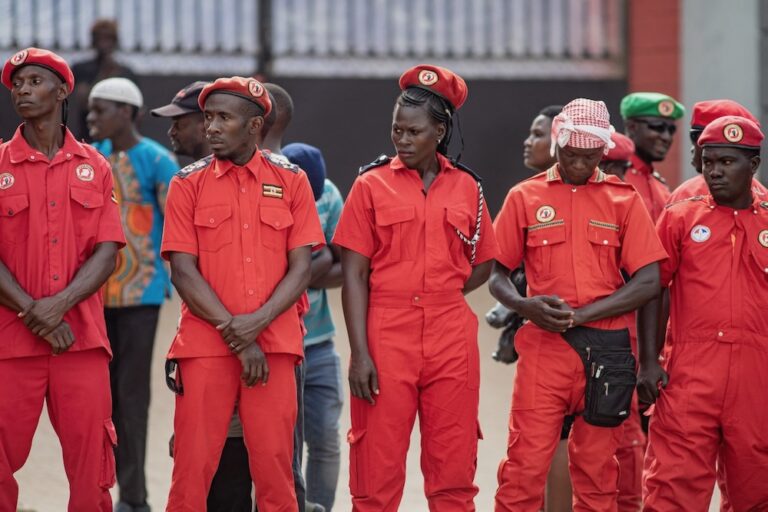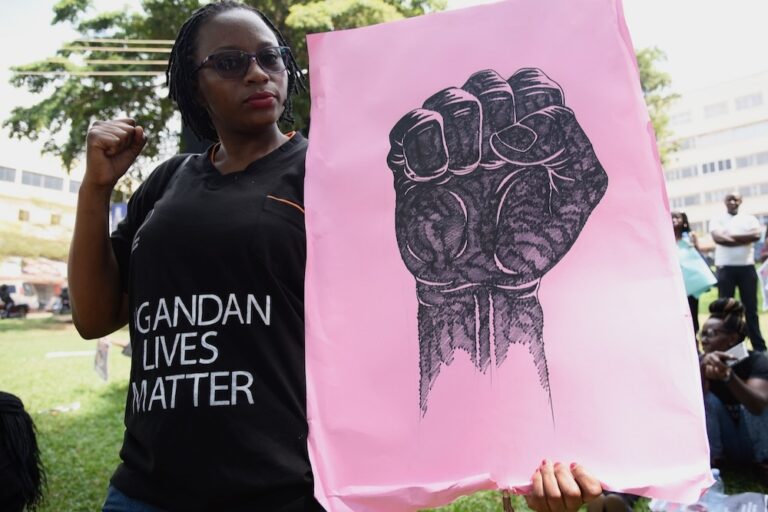The organisation documented 107 cases of attacks on journalists in 2011, compared to 58 in 2010 and 38 in 2009.
(HRNJ-Uganda/IFEX) – Kampala, 8 February 2012 – A Press Freedom Index Report released by the Human Rights Network for Journalists-Uganda (HRNJ-Uganda) has indicated that the space for the media in Uganda is rapidly “shrinking and sinking” due to increasing levels of attacks, especially by the police.
HRNJ-Uganda documented 107 cases of attacks on journalists in 2011 compared to 58 in 2010 and 38 in 2009. The incidents range from shootings, physical attacks, unlawful arrests and detention, incarceration of journalists, denying the media access to news scenes, confiscation of equipment, defective and tramped up charges, to verbal threats.
The report includes photographs of two journalists who were shot while covering news events. Christine Nabatanzi, a reporter with Radio Simba, was shot in the leg while covering Democratic Party supporters who were celebrating the release of their party president from prison, while Capital FM/ Beat FM reporter Gideon Tugume was shot when covering the return of the opposition FDC leader’s return to the country from Nairobi, in May.
The abuses happen countrywide under different commands from within the security. This clearly shows that press freedom remains elusive for many journalists seeking to enjoy these freedoms in the course of their work.
Increasingly, journalists are being targeted and attacked, injured, threatened and their property vandalized by mainly the police and army.
This is the 3rd time HRNJ-Uganda is releasing an annual assessment of press freedom in Uganda based on the investigations, analysis and documentation of complaints received from different parts of the country. The index highlights the continuous and systematic attacks on journalists by the Police, army and other security organs as well as non-state actors countrywide.
The report accuses the police and other security agencies of confiscating still and video cameras from journalists. Between April and May ten cameras were confiscated by security operatives as journalists covered the walk to work campaign. This trend indicates a systematic and calculated move by Police and other agencies to obstruct journalists from executing their duties.
Most worrying is the notable high degree of impunity and the disinclination by the law enforcement agencies and other institutions to pursue the perpetrators in spite of HRNJ-Uganda’s concerted efforts to engage them. The victims of these abuses deserve and await justice from the relevant institutions. This is an obligation the government must fulfill.
In the course of 2011, newspapers were raided and broken into, but there were no serious investigations by the Police to establish who the culprits are. Police stormed media houses searching for alleged ‘subversive’ materials. As a result, landlords, suppliers and printers of newspapers considered anti-government felt intimidated and threatened to abandon the targeted media houses. This conduct has led to the temporary closure and ceasing of the publication of newspapers.
By the end of 2011, about 30 journalists had pending charges against them. Only Daniel Kalinaki and Henry Ochieng, both editors at the Monitor Publications, only recently had their cases disposed of while the majority continues to have pending cases against them. The principle of natural justice demands that justice must be speedy and be seen to be done. This has continued to elude journalists in Uganda.
The media legal policies still pose a danger to the enjoyment of freedom of expression and the press. Efforts from government to bring into conformity the existing media legislation with the Constitution of Uganda and international standards are non-existent. Unfortunately, proposals are being made to introduce measures that undermine the enjoyment of press freedom.
Sadly, there is glaring silence from the statutory bodies that should be on the forefront of protecting and defending media freedoms.
It is a matter of concern that the Uganda Human Rights Commission has not taken any initiative to independently investigate and expose these abuses.
This statutory body has had over 25 cases brought to its attention by journalists, but none of them has been fully investigated and brought to a logical conclusion. Some cases date back as far as 2007.
It is against this background that HRNJ-Uganda sums up the space for press freedom in Uganda as “shrinking and seeking”. It requires a concerted effort from the stakeholders to play their role to rescue it from sinking further. This is the best time for all the various stakeholders to stand up and be counted.


